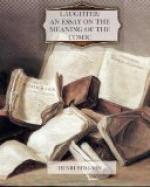Here, again, the comic will be emphasised by bringing it nearer to its source. From the idea of travesty, a derived one, we must go back to the original idea, that of a mechanism superposed upon life. Already, the stiff and starched formality of any ceremonial suggests to us an image of this kind. For, as soon as we forget the serious object of a solemnity or a ceremony, those taking part in it give us the impression of puppets in motion. Their mobility seems to adopt as a model the immobility of a formula. It becomes automatism. But complete automatism is only reached in the official, for instance, who performs his duty like a mere machine, or again in the unconsciousness that marks an administrative regulation working with inexorable fatality, and setting itself up for a law of nature. Quite by chance, when reading the newspaper, I came across a specimen of the comic of this type. Twenty years ago, a large steamer was wrecked off the coast at Dieppe. With considerable difficulty some of the passengers were rescued in a boat. A few custom-house officers, who had courageously rushed to their assistance, began by asking them “if they had anything to declare.” We find something similar, though the idea is a more subtle one, in the remark of an M.P. when questioning the Home Secretary on the morrow of a terrible murder which took place in a railway carriage: “The assassin, after despatching his victim, must have got out the wrong side of the train, thereby infringing the Company’s rules.”
A mechanical element introduced into nature and an automatic regulation of society, such, then, are the two types of laughable effects at which we have arrived. It remains for us, in conclusion, to combine them and see what the result will be.
The result of the combination will evidently be a human regulation of affairs usurping the place of the laws of nature. We may call to mind the answer Sganarelle gave Geronte when the latter remarked that the heart was on the left side and the liver on the right: “Yes, it was so formerly, but we have altered all that; now, we practise medicine in quite a new way.” We may also recall the consultation between M. de Pourceaugnac’s two doctors: “The arguments you have used are so erudite and elegant that it is impossible for the patient not to be hypochondriacally melancholic; or,




